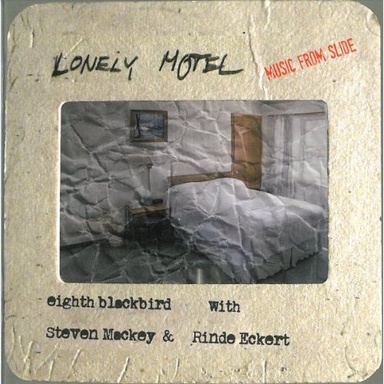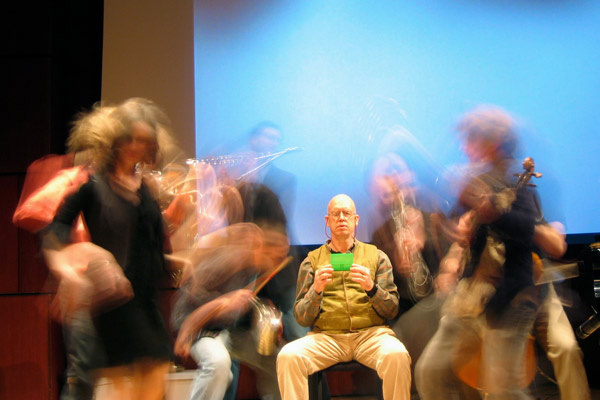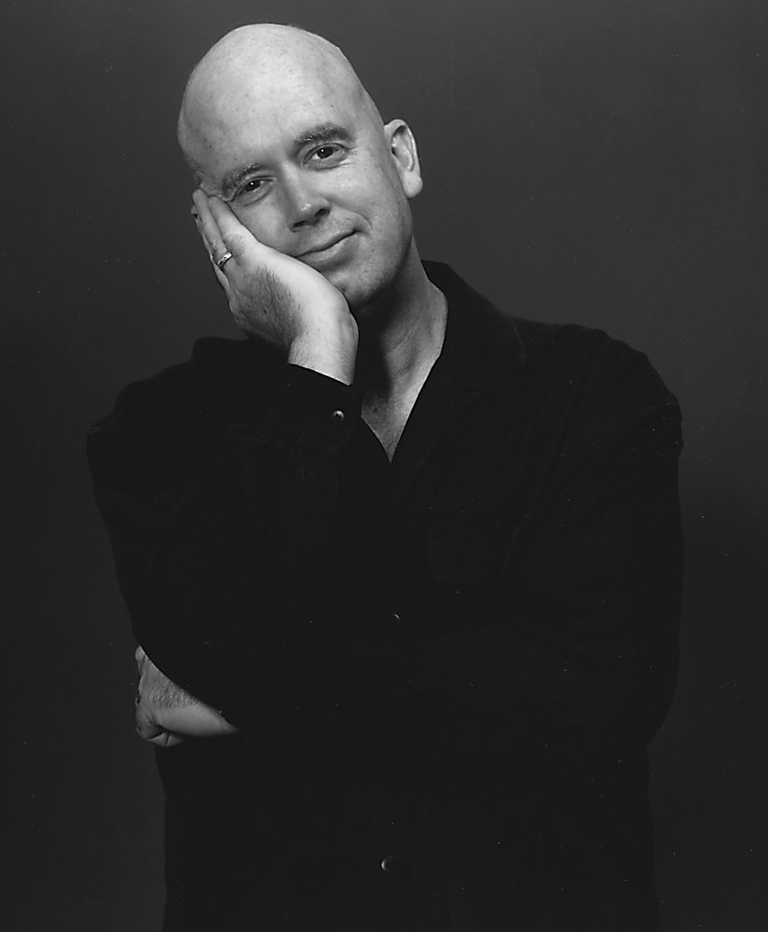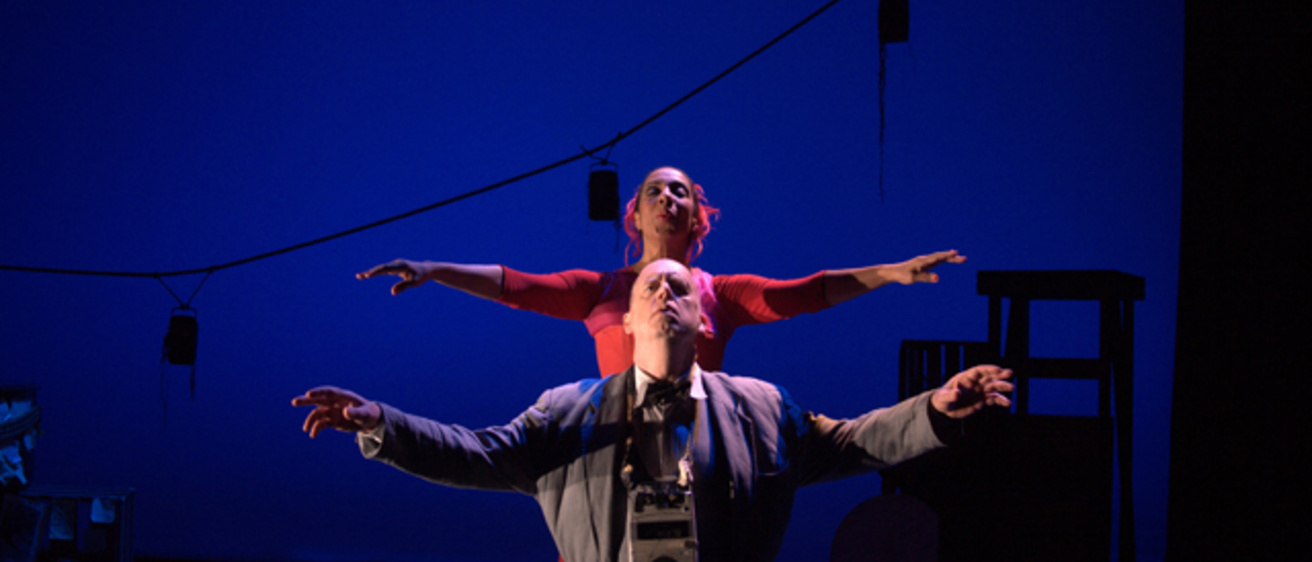Critics have difficulty labeling what University of Iowa School of Music alumnus Rinde Eckert does, but they agree he does it very well. A Village Voice critic called him “one of our theater’s most commanding presences.”
Recording Academy voters concurred this year, awarding him and the chamber ensemble eighth blackbird a Grammy for Best Small Ensemble Performance, for Stephen Mackey’s Lonely Motel – Music from Slide, for which Eckert also wrote the lyrics.
Of course, the first thing that has to be asked is the question that no journalist should ever ask, but they all do: How does it feel to win the Grammy?

I was opening an off-Broadway revival of my show And God Created Great Whales on the same day as the Grammy awards. I didn't know we'd won until the following morning when the email congratulations began. Since that particular project (Slide, the basis of Lonely Motel, our Grammy winner) had had a lot of ups and downs in its development, it was very satisfying to see it garner an award. It was something of a vindication of the faith and time we'd all put in on it. What I mostly felt was relief that Steve and I hadn't been wrong to pursue the idea in the first place.
Describe this project and summarize your history of collaboration with Mackey. And how did eighth blackbird get involved?

I believe eighth blackbird had commissioned something from Steve before. Steve and I had another ensemble in mind for this, but somehow it never got rolling. Since eighth blackbird was curating Ojai Festival, its members thought it would be the perfect place to try a radical piece of concert theater.
Will this lead to the re-release and promotion of your other recorded material?
Every time a project is successful, it helps. Sometimes producers need a little boost to get them over their trepidation at financing something novel. When they look at the Grammy on the wall, it encourages them to believe they're not crazy for wanting to work with you.
Where and when do they announce and present these awards that are apparently of lesser public interest to make the TV show?
The majority of the awards (the ones the viewing public doesn't care about) are handed out in the afternoon before the big TV extravaganza. They don't waste too much time and energy on it. It's like being at a school assembly in the gymnasium, an array of folding chairs before a moderately well dressed platform. Since the cameras aren't rolling, there doesn't seem to be a need for anything fancy.
You have to realize that there are six Grammy awards for the whole of the world of classical recording and 100 awards for the pop world (where the money is, and to be fair, the vast majority of recordings).
What are you working on now, and what's now on the "Horizon" for you?
I'm working on a new CD with my band Big Farm. We've finished the majority of the recording, but still have a lot of overdubs to do. I'm also working on a new solo CD with producer Lee Townsend. Then there's my new theater piece titled The Last Days of the Old Wild Boy, about a man raised by wolves. I'm also developing a new concert work with saxophonist Ned Rothenberg, writing a libretto for composer Paola Prestini, and dreaming up something to do with my actress/playwright wife Ellen McLaughlin. In my spare time I'm playing my harpsichord (built by Iowa City's own Edward Kottick) and teaching occasionally at Princeton.
What does it mean to artists a bit out of the mainstream to have places like the UI commissioning and/or presenting their work? You've created a substantial body of work connected with this place, your hometown, and alma mater.
In the mid '90s when I was making a critical change in my artistic life—moving to New York, changing my relationship with my longtime collaborator Paul Dresher, trying to retool for the next phase of my artistic life—Hancher Auditorium commissioned Idiot Variations. It was a vote of confidence at a time I badly needed it. I ended up performing the piece for 15 years all over the world (in three different languages) including Zankel Hall at Carnegie Hall.
Most recently they gave me the opportunity to stage Eye Piece with the assistance of the Department of Theatre Arts, under the excellent Alan MacVey. The work was ambitious (18 actors, 4 musicians). Without the UI faculty designers and technical staff, such an elaborate production would have been very difficult, if not impossible. Then there's just the satisfaction of coming back to my hometown.

Snapshot: Rinde Eckert
- Writer, composer, singer, instrumentalist, actor, director, recording artist, and even sometimes a dancer, renowned for his compelling and charismatic performances.
- An Obie Award winner, a 2007 Pulitzer Prize finalist in drama for Orpheus X, and the winner of a 2009 Alpert Award recognizing his career contributions.
- Son of longtime UI voice teacher Robert Eckert.
- Received bachelor's degree from UI School of Music; received a master's degree from Yale School of Music.
- Eckert’s career began as a writer/performer in the 1980s, writing librettos for the Paul Dresher Ensemble (Pioneer, Power Failure, Slow Fire, and Ravenshead, each of which was performed in Hancher).
- He began composing and performing his own music/theatre pieces with The Gardening of Thomas D, which had its commissioned world premiere in Hancher. His final performance in the old Hancher Auditorium, Horizon, attracted Drama Desk Nominations for Best Play and Best Director, and the Lucille Lortel Award for “Unique Theatrical Experience.”
- Along the way, Eckert has recorded several eclectic CDs, and he is now a member of Big Farm, a prog-rock quartet.
